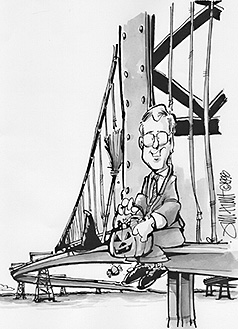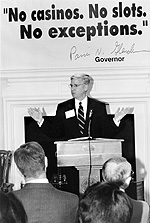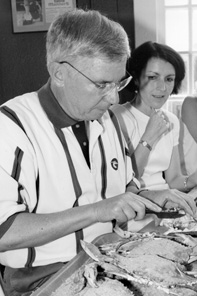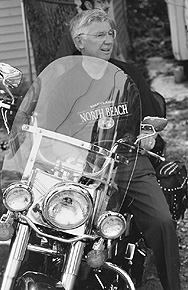
NBT Political Interview:
Gov. Glendening Makes His Case
Will the Chesapeake Bay be in danger If Ellen Sauerbrey becomes governor?
Parris Glendening thinks so.
You'd think in good times that a Democratic governor in a Democratic state could have a second term for the asking.
Nope.
Gov. Parris Glendening, the slightly nerdy professor who won Maryland's governorship four years ago, is up to his striped ties in political alligators. The toothiest, of course, is Ellen Sauerbrey, the former state legislative leader who has been running for governor since the early 1990s.
In the conservative Sauerbrey, Glendening met not only his philosophical opposite but also a champion for the over-regulated, the tax-burdened, the gun-fanciers and the flat-out hell-raisers of Maryland.
To survive, Glendening must persuade Marylanders that Sauerbrey is a bad fit for a progressive state with a quarter-million government employees and an ingrained environmental ethic. He must convince people that his many dust-ups with fellow Democrats don't matter. And he must pray for a sunny day so that even tuned-out folks vote.
Glendening, 59, sat for this interview in New Bay Times' offices with editor Sandra Martin, general manager Alex Knoll and political analyst and co-founder Bill Lambrecht over a lunch of Maryland crab dip, roast beef and chicken salad, pasta and potato salad and pineapple cake. (The governor ate one piece.)
Q Governor, what role are environmental issues playing in your re-election?
A New Bay Times followed our Smart Growth anti-sprawl policies and you know it has become a national model.
I think it's important in terms of being re-elected that people stand back and say 'he was re-elected in significant part because of the environment, because he's standing up against sprawl.'
We started as the catalyst for doing the right thing, and the Clinton administration is now proposing federal regulations in regard to animal waste run-off that would come up to ours. Had we not been there and done that, that stimulus wouldn't have been out there.
Hopefully, that will inspire other elected officials - governors, county executives, senators, delegates - to take similar positions in the future. They'll know that good environment is good politics as well.
Q One side of Smart Growth is preserving open space and concentrating growth on already developed areas. To look at the flip side, where does that growth go? Parole Plaza stands out. How can Smart Growth help do something with that eyesore?
A The full Smart Growth package went into effect October 1, so you're going to start seeing some significant changes. We've already started to make some of the changes.
For example, when I came into office, there were seven priorities on how you allocated school construction money. The number one priority was to accommodate overcrowding on account of new growth. The last was to revitalize existing communities. We turned it around entirely. The first one now is revitalizing existing communities.
We moved from about 46 or 47 percent of total school construction going into existing communities to, in this last budget, 82 percent going into existing communities. Under the new Smart Growth legislation, it will be even greater than that.
We're simply going to stop any state support for water and sewer, roads, schools and business loans that contribute to sprawl. And that frees up pots of money for us then to do things exactly like you're talking about: revitalization.
Q Is the environment going to be good politics in this election?
A In terms of the environment, there has not been a clearer difference [between myself and Republican candidate Ellen Sauerbrey]. I don't know of anyone running for governor any place in the country who has as bad an environmental record. Even among Republicans. Take Gov. Ridge up in Pennsylvania: he's got a fairly good record on several of these areas, but she has just a terrible, terrible record.
She supports strongly the Chamber of Commerce opposition to any regulations stronger than federal regulations. She insists that she's going to get a bill through that will prevent any tougher regulations. That might sound reasonable, but we've got one Chesapeake Bay here and we have very special, unique needs.
Every one of these plans in our anti-pfiesteria effort is a tougher regulation. So if she got that through, the entire anti-pfiesteria nutrient management program is gone. If she doesn't get it through the legislature - and she's made a commitment to the Chamber of Commerce - she can still do it by not putting the funding in there.
Q Explain what you mean by 'not putting in the funding.'
A In Maryland, we have the strongest budgetary process in the country. The legislature cannot add money to any project, and the legislature cannot transfer funds.
So [Sauerbrey] doesn't like the Critical Areas Commission. She opposed it in the past and that Frontier of Freedom group that she has says it's the confiscation of private property. If she simply eliminates or reduces funding for the Critical Areas Commission, it dies. She doesn't have to get this through the legislature. It just automatically dies.
She's vehemently opposed to our nutrient management anti-pfiesteria effort. We have $45 million projected for that in the next three budgets. She doesn't put it in the budget, it's going to be almost impossible for these small farmers to do what they must do.
Q Are you suggesting that the Chesapeake Bay under Sauerbrey could suffer further degradation? Or would it not simply be restored as swiftly as many people hope?
A I think it would deteriorate. She said herself, in the Washington Post, "There's no better indication of what you're going to do in the future than what you've done in the past."
The reason that's so important is that she voted against the Critical Areas Commission, which plays a crucial part in the protection of the Bay. She voted against clean water and against the phosphate ban. When we tried to protect horseshoe crabs, she ridiculed that. When we considered new regulation on the blue crabs, her comment was that the crab shortage was only a natural cycle. If we had listened to that kind of philosophy when Gov. Harry Hughes stood up the first time on the rockfish, we wouldn't have any rockfish out there now.
If that's her orientation, what's she going to do in the future?
Q She would dispute that, governor, and say that she's changed her positions over the years and that she wouldn't do anything debilitating to Smart Growth and wouldn't kill your anti-pfiesteria programs. But you're saying we should judge her by her past?
A She's saying it: judge me by my past record, number one. Number two, she's telling others the opposite.
As an example, in the Washington Post she was questioned about how she was going to pay for this tax cut. She said, among other things, 'I'll get rid of the funding that's going for museums, art, historic preservation and those types of programs.' A lot of that, especially the historic preservation, is also the money we're using for revitalization.
I think what we really should recognize - and we don't want to wake up November 4 and recognize this - is that she's serious about what she fought for the last 16 years, and now she's trying to mask it. But I believe you'd see a serious degradation of the Bay under that administration.
Q These are good economic times in Maryland. Can you revert to being a professor of political science as you once were and tell us why Parris Glendening is fighting for his political life?
A There are a number of reasons. One is, of course, that we had an extraordinarily bitter campaign in the primary, followed by a bitter campaign in the general election. In modern times, there's not been a back-to-back, divisive bitter primary and general. Sometimes there have been tough primaries, sometimes tough generals, but never back to back.
Then, of course, she contested the outcome of the 1994 election. She contested the will of the people in the most divisive, highly publicized way, and normally what would be a honeymoon period as I started to bring together the budget, the legislative package and make the appointments, we were out there both in the courts as well as publicly defending the outcome of the election every single day up until about 18 hours before the inaugural itself.
Subsequently, quite honestly, we made a couple of early mistakes and got off to a rough start.
QAre there other reasons this election is so close?
A We've forcefully taken on a number of special interests. In every session, we've been involved in these huge battles. In the very first session, for example, we were involved with the tobacco lobby. That's when we got our very strong smoking bill through, and you know the huge difference in air quality inside our buildings as a result.
The next year, we took the National Rifle Association on and got in a huge battle then. Then we took on excessive developers in the whole Smart Growth issue and got into a battle there. Last year, we took on polluters in terms of the effort to protect against nutrient and animal waste run-off in the water.
Every time, we have taken on a huge group, and while your friends forget, your enemies stay with you.
Q What about the pro-gambling
industry?
A The casinos have been another big issue, and you can see what's happening right now. They literally have made a million dollar airtime purchase, and they're running those ads all over the state, saying this is going to be a wonderful thing, to bring slot machines and casinos into the state.
It's not. It's going to be a horrible thing. Crime goes up, official corruption goes up. Perhaps most sad, domestic violence almost doubles: people lose their paycheck, they lose their rent or mortgage payment, they go home and start arguing, and domestic violence goes right through the roof.
When slots were in Southern Maryland, it was a disaster for the economy. It sucked all the money out of the economy and led repeatedly to corruption and crime. It took a lot of courage for governors and legislatures to stop slot machines.
I find it particularly offensive, even perverse, what they're saying now: 'Slots for tots.'
QYour opponent doesn't see it that way
A The thing that's even more outrageous is that she's calling for a tax cut while saying we don't have money for education. So if they pass a slots bill, provided it's a referendum, she'll sign it. These ads have showed us already what is going to happen. The casino people will come in and they'll put $10, 20, maybe 30 million into this referendum. There'll be so many pictures of beautiful little children walking through valleys picking flowers that you'll forget what the whole issue is all about.
So I've made no secret about it. I'm not going to sign the bill, I'll veto any bill, I don't care whether it's a referendum or anything else. I think it's time to stand up and say what you believe is right. She's saying, 'well, I don't believe in slots, but I'll go ahead and permit it to come in if that's what's needed.' It doesn't make any sense, and I'm opposed to it.
Q It's no secret you've had trouble communicating with voters
A It's sometimes difficult getting the message out, that's clear. The major media tends to focus on the purely political aspect of things. There was minimal coverage of the actual substance of our Smart Growth initiative. Minimal coverage of the substance of nutrient management and waste run-off controls. It was all about the political battle. Then, of course, a lot of people get their news from television, so you have 9.2 seconds to explain what you're doing in your policy.
I think all of that's part of it. The other part, someone suggested, is that maybe we tried to do too much. There were so many different things we did that the public didn't focus on one thing, didn't identify us with that one thing.
The economy is just absolutely booming right now. Record jobs, family income, new businesses. Even with 10 percent tax reduction, revenues are way up. Crime is way down, welfare is cut in half, our environmental policy is one of the best in the country, our school construction. We have done so much that it's hard for the public to say, 'I identify this governor particularly with '
I'm pleased that we were able to get a lot done, but we've sort of defused the effect.
Q You've brought up the rockfish moratorium in talking about the health of the Bay. Let's say hypothetically that after the election you're still governor and the blue crab situation gets worse. Could you see yourself putting a crab moratorium in place if that were needed?
 A Hopefully
it won't be needed, but you have to do whatever is necessary to protect
the basic stock. It's very, very difficult, I understand this, but when
the oysters and clams were about wiped out, that had just a devastating
impact on the quality of the Bay overall. If Governor Hughes had not imposed
a moratorium on rockfish, everybody up and down the East Coast concurs,
there would not be rockfish. The same with the crabs: you have to do whatever
is necessary.
A Hopefully
it won't be needed, but you have to do whatever is necessary to protect
the basic stock. It's very, very difficult, I understand this, but when
the oysters and clams were about wiped out, that had just a devastating
impact on the quality of the Bay overall. If Governor Hughes had not imposed
a moratorium on rockfish, everybody up and down the East Coast concurs,
there would not be rockfish. The same with the crabs: you have to do whatever
is necessary.
It's the watermen and a way of life in Maryland. It doesn't make any difference where you are. I remember sitting with my in-laws regularly, especially in the fall, on a deck they had in Cumberland, when we would have crab feasts way up there.
Q So you're a crab-eater yourself?
A I'm a crab-eater. I love crabbing. I do the trotline thing myself. Just having the chance of losing it would be so outrageous, so I'm hoping that reasonable, responsible interim regulations will deal with the problem, but I'm committed to whatever is necessary to protect the resource. If it did become severe, there are all different ways of doing it. A good example is when the state picked up indirectly some of the cost of the charterboats when the rockfish moratorium was on. If we had to do something along that line, I'd be prepared do it. But I would not permit the Maryland blue crab to go extinct under this administration.
Q Are you worried?
A We're going to win, there's no doubt about it. It's going to be tough. We've got to turn out the vote, we've got to make sure that people do understand the things that matter. That's why we've been running those very aggressive, comparative ads on television. She's complaining, but we're proud of our record of fighting gun violence. We're proud of our record on the environment, and we have more coming up. And as you see those, it makes pretty clear the difference in the candidates.
In the last three weeks, the general public is just starting to focus on this. People in the environmental community are very attentive and they know every line in every bill and every piece of land that's potential for development. But the general public tends to say, 'I'm frustrated with the sprawl or frustrated here, but doesn't focus on it.' It's only in the last three weeks that we focus on it and try to get message out. We're hoping you can help us in making clear what is at stake in this election.
Q Will your environmental policy in the next four years strengthen and build on what you've done before or do you have anything new in mind?
A There are two levels of that. The largest approach is going to be the very aggressive implementation of the programs we've already adopted. The Rural Legacy program, for example, is very, very significant, and we want to get it really deeply institutionalized. This will be the first budget of implementation of Smart Growth where every budget item, not just capital items but every program, is now looked at for whether it's consistent with Smart Growth. And with the full implementation of the pfiesteria efforts, those will be major ones, there.
We will continue with several major new initiatives. One is going to try to make mass transit work a lot better than it does. We can't continue to build these 16- and 18-lane roads from point A to point B and think we're solving transportation problems.
That's the one part. The other is that we're going to have even more aggressive, comprehensive plan to help revitalize existing areas, and not just the large ones that are obvious such as Baltimore City or Silver Spring but a lot of smaller communities that sprawl seems to be occurring around.
Q We caught up with you
on a Smart Growth tour in one of those smaller communities, North Beach.
A The most humorous picture that you ran, in my mind, was the one of me on the motorcycle when I was down in North Beach.
If you knew how out of character that was for me ... The one that really loved it was our son, Raymond.
'Dad, can't believe it, look at that Dad!' he said. He took a copy of it to college with him to show his friends his dad on that Harley. I said, 'Don't tell them I started that thing up, because I didn't do that.'
Q We'd be remiss if we didn't touch on another Smart Growth issue, and that's Franklin Point. Why did it take so long?
A The reason for the delay is that I've known the developer for 25 years; quite candidly, he's been a friend and political supporter. If we did anything on the acquisition that wasn't 100 percent according to the books, others would yell.
If we didn't have the appraisals in hand, others in the media in particular would say the governor bought this for $3 or $4 million from a person who's supported his campaign in the past.
Why subject everyone - the people who want this so much in the community as well as myself - to that?
Q Why, from the state's standpoint, is that 477 acres a good acquisition?
A There are several reasons. One of them goes back to Louie Goldstein's observation that the 'Good Lord's not making any more land.' He told me that when I was county executive in Prince George's County and we started buying land along the Patuxent River.
I don't know whether you've noticed the difference between the two counties. We decided we would buy - either the development rights or outright - almost all the land along the Patuxent River from Charles County up to about Rt. 50, Queen Anns Bridge. If you go along on the Prince George's side, there's almost no development; we basically have helped preserve a hundred square miles of open space there.
When we started that program, we asked the state to help us buy land for the Patuxent River Basin Plan. Louie came down as part of the Board of Public Works when we bought the first big parcel. 'Mr. County Executive,' he said, 'this is good. the Good Lord's not making any more land. Buy it while you can.' I thought about that subsequently, and it's been part of our philosophy behind some of these purchases.
The other thing is that Southern Anne Arundel County is under huge development pressure. You're not going to get a tract this large and this sensitive very often.
We have the resources to do this now. The economy is doing so well that we have a huge surplus built up. Now is the time to buy it. We're paying cash so we won't have any interest charge. So it seemed to me that we ought to just move now - whether it's this parcel, Deep Creek Lake or Smith Farm in Howard County.
If Governor Hughes had not imposed a moratorium on rockfish there would not be rockfish.'
Q Do you ever get out on the Bay?
A My son Raymond said 'what do you want for Father's Day?' I think he thought he was going to get away with a shirt and go off with his friend. I said I wanted a day of fishing with him.
Ten of us on the boat, we just had a banner day of rockfishing. It was tremendous. It was really, really the type of day I wanted. That wouldn't be there if we had followed her course.
Editor's note: Ellen Sauerbrey, the Republican gubernatorial candidate, declined invitations to visit or otherwise speak with New Bay Times about Chesapeake Bay, her environmental record and other matters raised in this interview.
| Back to Archives |
VolumeVI Number 43
October 29 - November 4, 1998
New Bay Times
| Homepage |